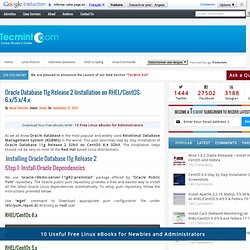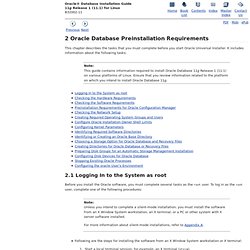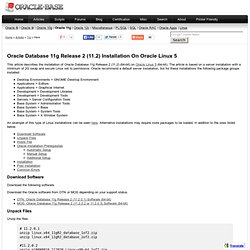

Oracle Database 11g Release 2 Installation on RHEL/CentOS 6.x/5.x/4.x. As we all know Oracle database is the most popular and widely used Relational Database Management System (RDBMS) in the world.

This post describes step by step installation of Oracle Database 11g Release 2 32bit on CentOS 6.4 32bit. The installation steps should not be vary on most of the Red Hat based Linux distributions. Installing Oracle Database 11g Release 2 Step 1: Install Oracle Dependencies We use “oracle-rdbms-server-11gR2-preinstall” package offered by “Oracle Public Yum” repository.
Use “wget” command to Download appropriate yum configuration file under /etc/yum.repos.d/ directory as root user. RHEL/CentOs 6.x # cd /etc/yum.repos.d # wget RHEL/CentOs 5.x # cd /etc/yum.repos.d # wget RHEL/CentOs 4.x # cd /etc/yum.repos.d # wget Now perform the following “yum” command to install all the necessary prerequisites automatically. [root@oracle]# yum install oracle-rdbms-server-11gR2-preinstall While importing GPG key, you might get “GPG key retrieval failed” error as shown below. Oracle Database Preinstallation Requirements. This chapter describes the tasks that you must complete before you start Oracle Universal Installer.

It includes information about the following tasks: Note: This guide contains information required to install Oracle Database 11g Release 1 (11.1) on various platforms of Linux. Ensure that you review information related to the platform on which you intend to install Oracle Database 11g. 2.1 Logging In to the System as root Before you install the Oracle software, you must complete several tasks as the root user. Unless you intend to complete a silent-mode installation, you must install the software from an X Window System workstation, an X terminal, or a PC or other system with X server software installed. For more information about silent-mode installations, refer to Appendix A. 2.2 Checking the Hardware Requirements The system must meet the following minimum hardware requirements: Oracle Database 11g Release 2 (11.2) Installation On Oracle Linux 5.
This article describes the installation of Oracle Database 11g Release 2 (11.2) (64-bit) on Oracle Linux 5 (64-bit).

The article is based on a server installation with a minimum of 2G swap and secure Linux set to permissive. Oracle recommend a default server installation, but for these installations the following package groups installed: Desktop Environments > GNOME Desktop Environment Applications > Editors Applications > Graphical Internet Development > Development Libraries Development > Development Tools Servers > Server Configuration Tools Base System > Administration Tools Base System > Base Base System > System Tools Base System > X Window System An example of this type of Linux installations can be seen here.
Alternative installations may require more packages to be loaded, in addition to the ones listed below. Download Software Download the following software. Download the Oracle software from OTN or MOS depending on your support status. Unpack Files Unzip the files. Hosts File. HOWTO install Oracle 11g on Ubuntu Linux 12.04 (Precise Pangolin) 64bits. Esta página ha sido traducida en español por Maria Ramos de Webhsotinghub.com/support/edu Before starting Since release 11.10 it is more difficult to install Oracle 64bits on Ubuntu.

If you need to run Oracle on a production environment, please install a supported Linux distribution. So why installing Oracle on Ubuntu ? You may manage Ubuntu servers and cannot use other linux distributionsYou may be a developper, and clearly, ubuntu is a good choice for the desktop environment so you want to continue developing on your favorite distributionYou may be a student learning Oracle, and clearly, ubuntu is a good choice for the desktop environment so you want to continue learning on your favorite distributionBecause you want to ! Clearly, Oracle should officially support ubuntu linux ! Since version 11.10 of Ubuntu, installing Oracle as become much more complicated than already described in this previous Oracle installation guide on Ubunto 64bits how to. So, why writing my own ? We will have to: